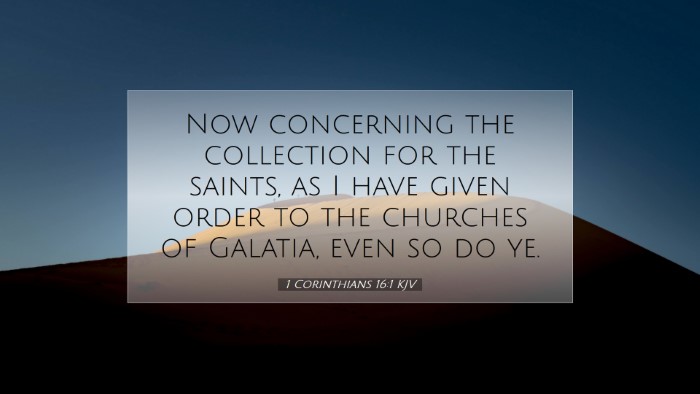Commentary on 1 Corinthians 16:1
Verse: "Now concerning the collection for the saints, as I directed the churches of Galatia, so you also are to do." (1 Corinthians 16:1, ESV)
Introduction
The Apostle Paul, in his first letter to the Corinthians, addresses a critical practical matter concerning charitable collections, specifically for the impoverished saints in Jerusalem. This passage reveals the significance of communal support and stewardship within the Christian community.
Historical Context
This epistle was written during a time when the early church faced severe persecution and poverty. The collection mentioned was intended to support believers in Jerusalem who were enduring great hardship. Paul’s approach provides a model for organized giving within the church.
Exegesis of the Verse
Paul transitions from discussing spiritual matters to practical ones with the phrase "Now concerning." This indicates a response to a previous inquiry from the Corinthians. He introduces the subject of collecting financial aid for the saints in Jerusalem, paralleling the practice he encouraged among the Galatian churches.
Insights from Matthew Henry
Henry emphasizes the importance of charity in the Christian faith, noting that this collection is not merely a suggestion but a directive aimed at aiding those in genuine need. He highlights three key aspects:
- Unity: This act of giving strengthens the bonds within the body of Christ, showcasing love and solidarity among believers.
- Responsibility: It is the duty of the affluent to assist the less fortunate, reflecting Christ’s example of generosity.
- Regularity: Henry suggests Paul advocates for systematic giving—an organized effort rather than sporadic, impulsive contributions.
Insights from Albert Barnes
Barnes focuses on the theological implications of this collection. He notes that Paul addressed this practice with the authority of apostolic leadership, reinforcing the communal responsibilities Christians hold toward one another. Key observations include:
- Inclusivity: The collection is to be taken from all believers, indicating that every church and individual has a role in supporting one another.
- Example of Galatia: By referencing the practices of Galatian churches, Paul illustrates the expected behavior from the Corinthians, advocating for a unified effort among the churches.
- Spiritual Resource: Barnes points out that this financial support is not merely a physical necessity but a spiritual duty that embodies the heart of the gospel—selflessness.
Insights from Adam Clarke
Clarke's commentary provides a practical perspective that dovetails with the previous insights. He articulates the rationale behind the collection as a form of obedience to God. Along with the thematic elements, he presents further reflections:
- Stewardship: Clarke emphasizes that Christians are stewards of their resources, entrusted by God to manage wealth for the benefit of others.
- Motive for Giving: The genuineness of one’s commitment to Christ is demonstrated through the willingness to aid those in need. Clarke insists that the condition of the heart in giving is as important as the actions themselves.
- Preparation: He mentions that Paul encourages the Corinthians to prepare ahead of time for the collection, indicating a need for planning and consideration in acts of service and charity.
Theological Reflection
This verse compels Christians to realize the importance of their financial contributions to the church and communities. It highlights a broader theological truth: the church is not merely a collection of individuals, but a body unified in purpose and support. Giving should not be a burden or an afterthought, but an integral part of the believer's life.
Practical Applications
The applications of this scripture stretch beyond the immediate context and challenge believers today:
- Community Engagement: Modern churches should adopt programs for benevolence and support, ensuring no member of the body suffers alone.
- Stewardship Teaching: Teaching on financial stewardship should be a regular part of church life, helping congregants grasp that their resources are not exclusively for personal use, but for collective benefit.
- Cultivating Generosity: Encouragement for congregants to develop a heart of giving, fostering a culture of generosity where members actively seek ways to support one another.
Conclusion
The apostle Paul’s instruction in 1 Corinthians 16:1 serves as a timeless reminder of the collective responsibility of the Christian community. By learning from the insights of Henry, Barnes, and Clarke, we can understand the profound implications of supporting one another through our resources, reflecting the love of Christ in tangible ways.


